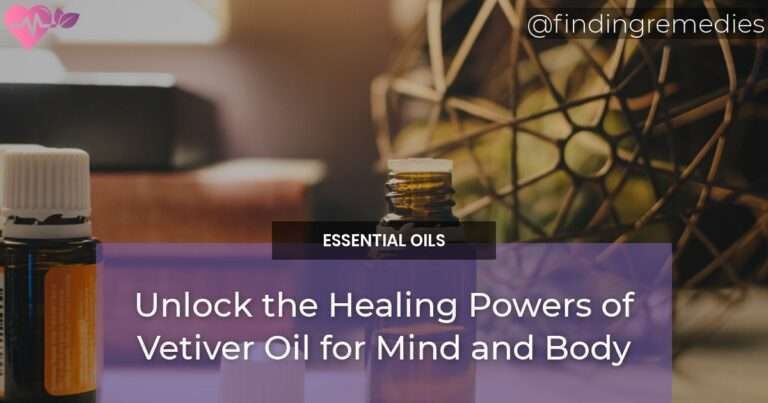Vetiver oil, also known as khus oil, is derived from the roots of the vetiver plant, scientifically known as Vetiveria zizanioides. Its earthy and exotic aroma makes it a popular choice for aromatherapy massage and diffuser blends. Apart from its enticing fragrance, Vetiver oil has a plethora of physical and mental health benefits. Let’s explore the benefits, uses, and precautions of vetiver essential oil.
Table of Contents
What is Vetiver Oil?
Vetiver oil is a dark brown or amber-colored oil extracted from the roots of the vetiver plant through steam distillation method. It has a long history of traditional use in Ayurvedic medicine to treat various ailments. It’s a thick oil that requires dilution before topical application.
Extraction Process of Vetiver Oil
The extraction of vetiver oil is a laborious process. The vetiver roots are harvested, washed, dried, and soaked in water for 24 hours to soften them. The softened roots are then chopped into small pieces and steam distilled to extract the oil. It takes about 250 kg of vetiver roots to produce 1 kg of vetiver oil.
Chemical Composition of Vetiver Oil
Vetiver oil is a complex blend of sesquiterpenes, sesquiterpenols, and sesquiterpene esters. The major constituents of vetiver oil are khusimol, vetiselinenol, isovalencenol, and α-vetivone. These constituents contribute to the unique aroma and therapeutic properties of vetiver oil.
Benefits of Vetiver Oil
Physical Benefits of Vetiver Oil
- Relieves inflammation: Vetiver oil has anti-inflammatory properties that help reduce inflammation and pain in the body. It’s useful in relieving arthritis, muscular pain, and headaches.
- Improves digestion: Vetiver oil aids digestion by stimulating the secretion of digestive enzymes. It also helps treat digestive issues like indigestion, bloating, and constipation.
- Boosts immune system: Vetiver oil has immune-boosting properties that help fight infections and improve overall health. It’s useful in preventing cold, flu, and other infections.
Emotional and Mental Benefits of Vetiver Oil
- Reduces stress and anxiety: Vetiver oil has a calming effect on the mind and body. It helps reduce stress, anxiety, and nervousness. It’s useful in promoting relaxation and sleep.
- Enhances mood: Vetiver oil has mood-enhancing properties that help uplift the mood and promote a positive outlook. It’s useful in treating depression and mood disorders.
- Boosts brain function: Vetiver oil improves brain function by enhancing cognitive abilities like concentration, memory, and alertness. It’s useful in treating ADHD, dementia, and other cognitive disorders.
Uses of Vetiver Oil
In Aromatherapy
Vetiver oil is a popular choice among aromatherapists due to its grounding and calming properties. It blends well with other essential oils like lavender, bergamot, and ylang-ylang. It’s useful in diffuser blends, massage oils, and bath salts.
In Skincare
Vetiver oil has moisturizing and anti-aging properties that help rejuvenate the skin. It’s useful in treating acne, eczema, and other skin conditions. It can be added to face creams, serums, and lotions.
In Haircare
Vetiver oil has a nourishing effect on the scalp and hair. It helps treat dandruff, dry scalp, and promotes hair growth. It can be added to hair oils, shampoos, and conditioners.
Safety Considerations for Vetiver Oil
Risks Associated with Vetiver Oil
Vetiver oil is generally safe for topical and aromatic use. However, it’s advisable to do a patch test before using it on the skin. It’s also not recommended for internal use as it can be toxic in large doses.
How to Use Vetiver Oil Safely
- Dilute vetiver oil with a carrier oil before topical application.
- Avoid using it during pregnancy and breastfeeding.
- Keep it away from the reach of children.
- Store it in a cool, dry place away from direct sunlight.
Conclusion
Vetiver oil is a versatile essential oil with numerous physical and mental health benefits. Its calming and grounding properties make it a popular choice for aromatherapy and stress management. However, it’s important to use vetiver oil safely by following the recommended precautions. Try using organic or therapeutic grade vetiver oil for maximum benefits.

